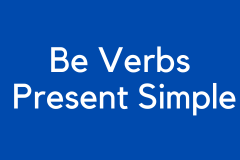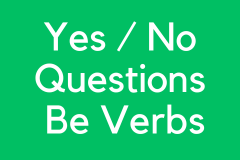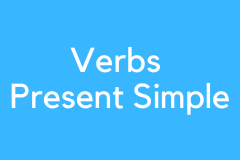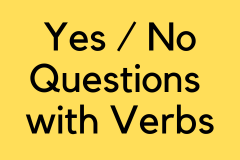Be Verbs
Learn how to make basic sentences with Be verbs in the simple present tense.
Answer the following questions about the interview.
Be Verbs (am, is, are) Simple Present
Point 1: The be verb has three forms in the present tense: am, is, and are. It connects a subject with a noun, adjective, or preposition.
Before Nouns
- I am a teacher.
- You are a student.
Before Adjectives
- I am hungry.
- It is hot today.
Before Prepositions
- She is at home.
- The books are on the table.
Point 2: Use am and am not with the pronoun I.
- I am American.
- I am not tired.
- I'm happy. (am = 'm)
- I'm not sad. (am = 'm)
Point 3: Use are and are not with the pronoun you.
- You are a student.
- You are not a teacher.
- You're a nice person. (are = 're)
- You're not late. (are not = 're not)
- You aren't late. (are not = aren't)
Point 4: Use is and is not with the pronoun she.
- Mary is my friend.
- She is not my sister.
- She's very smart. (is = 's)
- She's not here. (is not = 's not)
- She isn't here. (is not = isn't)
Point 5: Use is and is not with the pronoun he.
- Jason is my friend.
- He is not my brother.
- He's very smart. (is = 's)
- He's not here. (is not = 's not)
- He isn't here. (is not = isn't)
Point 6: Use is and is not with the pronoun it.
- The weather is cold today.
- It is not warm.
- It's easy. (is = 's)
- It's not hard. (is not = 's not)
- It isn't hard. (is not = isn't)
Point 7: Use are and are not with the pronoun they.
- Beth and Bob are my friends.
- They are not from here.
- They're nice people. (are = 're)
- They're not shy. (are not = 're not)
- They aren't shy. (are not = aren't)
Point 8: Use are and are not with the pronoun we.
- My friend and I are here.
- We are not late.
- We're good friends. (are = 're)
- We're not busy. (are not = 're not)
- We aren't busy. (are not = aren't)
Point 9: In question sentences, the be verb changes to match the subject.
- What is your favorite food?
- When is the meeting?
- Who are your teachers?
- Where are the bathrooms?
- Why is it cold in here?
- How are you?
- How is school?
- How are your classes?
- Why am I here?
- Why is she late?
- Why isn't she here?
- Why aren't you mad?
Point 10: In yes/no questions, the be verb matches the subject.
- Am I late?
- Is she here?
- Are my keys on the table?
- Are you from around here?
- Is your dad a doctor?
- Is English easy for you?
About the Teacher
 My name is Todd Beuckens and I am an ESL teacher in Japan.
My name is Todd Beuckens and I am an ESL teacher in Japan.
I created this site to provide teachers and students free audio lessons and learning materials not usually found in commercial textbooks.










